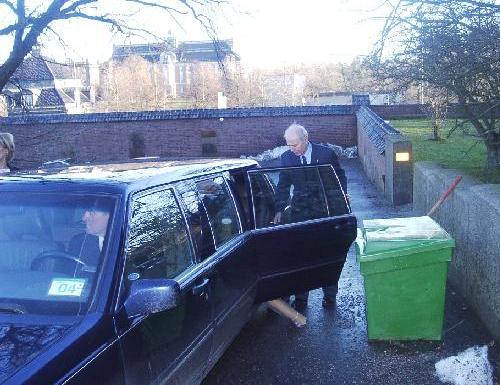Nobel laureates in chemistry, physics and economics condemn the boycott imposed by the University of London on scientists from Israel. The Israeli Nobel laureates were the stars of the press conference
Avi Blizovsky, Stockholm

The date of writing the news is Tuesday 7.12.04
Nobel prize winners in chemistry, physics and economics unanimously condemned the academic boycott issued by the University of London against researchers and institutions in Israel. This is what some of the winners said in response to an Israeli journalist's question at a press conference held at the Swedish Academy of Sciences this morning.
"An intolerable scandal and a disgusting phenomenon", is how the winner of the Nobel Prize in Physics for 2004, Prof. David Gross, defined the call issued by the University of London to boycott Israeli scientists. "There are ways of expressing protest, but science must be kept aside," he emphasized. Hera was held after him by Nobel laureate Prof. David Pulitzer, also laureate of the Nobel Prize in Physics for 2004. I absolutely support Prof. Gross's words.
"It is unthinkable to isolate scientists," said Prof. Pulitzer. The secretary of the Royal Swedish Academy of Sciences, Gunnar Koist, summarized the discussion on this matter. "The academy must be kept completely free of politics."
The secretary of the Swedish Academy of Sciences asked what about the scientific curiosity of two young people to engage in science
Hershko said: Scientific curiosity is an important factor. I am as excited today as I was a year ago when there is a positive result for the experiment. The young people should have this curiosity.
Nobel Laureate in Physics: David Gross: Most of the important questions have yet to be asked, the more we discover the more we realize how little we know. It's more exciting than making money. Chechenover: We in science always walk in the temple of knowledge. Avraham and I come from the world of medicine. The patient also sleeps there and we work for him, to solve diseases.
How do you explain that the Americans are dominant among the Nobel Prize winners, including on this stage?
Gross: Science advanced a lot in the US thanks to the opening of federal pockets after World War II and especially after the Russians got ahead of the Americans in the space race when they launched the first Sputnik satellite. In general, this success must also be attributed to the open American system, there is a great leadership among universities. Prescott: The answer is in encouraging American excellence and a lot of competitiveness. Hershko: This is due to the great friendliness of the USA towards foreign scientists. Chechenover: There is an American government priority for science. In Europe and also in Israel, moving from one university to another is impossible, you are considered a half-traitor.
I asked Prof. Irwin Rose how ubiquitin was discovered and why with the help of Israeli scientists
Rose: At first I completely failed to ask what causes the proteins to break down. Fortunately, the Israelis preceded me, came to me and helped me a lot. Actually, I was pretty close to finding this out myself but in the experiments my research assistant did the ubiquitin kept getting destroyed.
Hershko: "Sometimes there is also an effect of random phenomena" After I did not find a place in a research group that dealt with the construction of proteins and enzymes, I happened to meet Prof. Rose at a scientific conference, and I was surprised that there were almost no articles on the breakdown of proteins. He urged me to try to research in this direction, and I came to him for a sabbatical. Chechenover: "My job was the easiest. I was a doctoral student of Avraham when they had already focused on the question but had not yet discovered the mechanism that causes the breakdown of proteins.
I also asked the other winners what they thought about the first Israeli Nobel Prize
"I think the time has come," said Prof. Gross, who graduated from high school in Jerusalem, as well as a bachelor's and master's degree at the Hebrew University of Jerusalem.
Tomorrow - Wednesday, the Nobel lectures of the winners are expected, as well as a Hanukkah candle lighting ceremony organized by the Technion in one of Stockholm's luxurious hotels.
